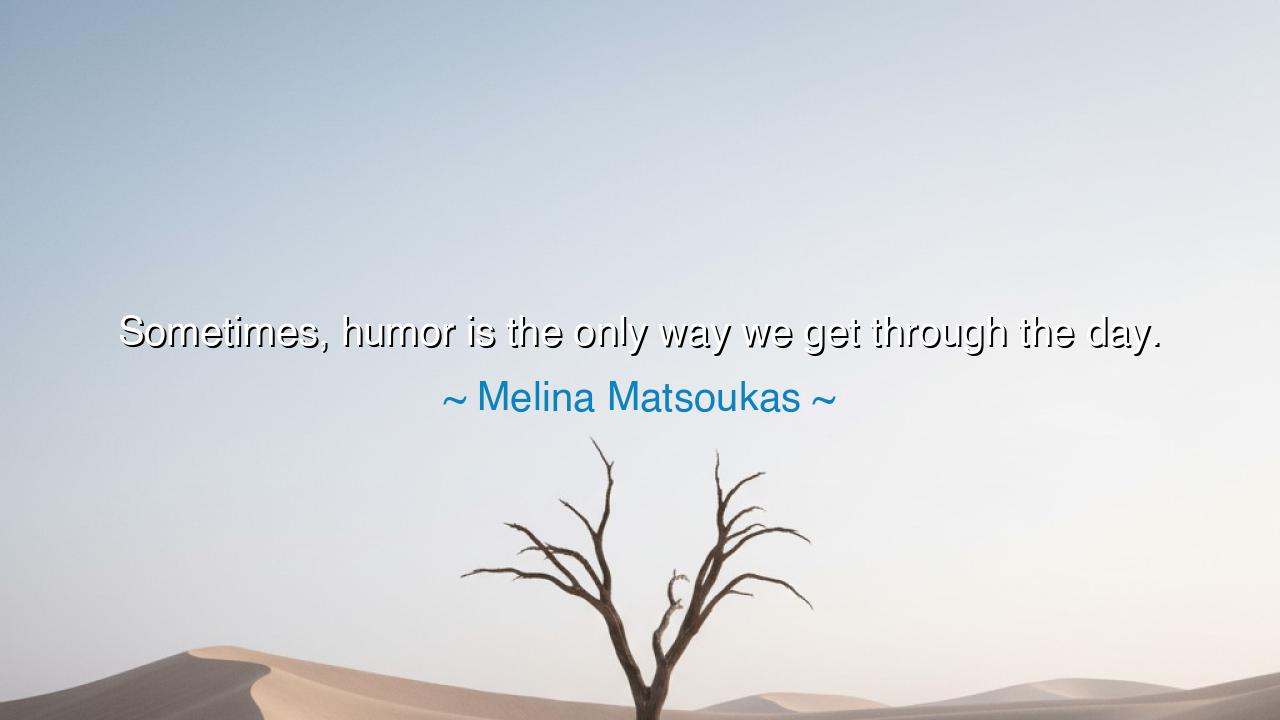
Sometimes, humor is the only way we get through the day.






The words “Sometimes, humor is the only way we get through the day” by Melina Matsoukas rise from the heart of the human experience — words simple in form, yet vast in meaning. They speak to that ancient, unbreakable truth: that laughter is the soul’s final line of defense when all else fails. It is the breath that keeps the weary alive, the spark that burns even in darkness. In these few words lies a wisdom that belongs not only to artists or philosophers, but to every soul that has endured hardship and chosen, somehow, to smile anyway.
To say that humor gets us through the day is to acknowledge that life, for all its beauty, is often unbearably heavy. There are mornings when sorrow clings like fog, when burdens seem endless, when hope itself flickers. Yet, in those moments, a single laugh can break the weight of despair like dawn breaking through night. Humor is not denial — it is resilience disguised as joy. It does not erase suffering; it transforms it. It is the light that leaks through the cracks of the human heart, saying, yes, I hurt — but I am still here.
The ancients knew this truth long before the age of modern grief. The Greeks, who gave the world both tragedy and comedy, believed that laughter was sacred — a gift from the gods to remind mortals of their divine spark. Even in mourning, they gathered to tell stories, to find absurdity amid the ruins of fate. In the marketplace, in the theater, and around the fire, humor became the great equalizer, lifting kings and beggars alike. In those moments of laughter, humanity reclaimed itself — small but mighty, fragile yet undefeated.
Consider the story of Winston Churchill, who led his nation through the fires of World War II. When the bombs fell on London and the city burned, Churchill often disarmed fear with wit. “If you’re going through hell,” he said, “keep going.” His humor was not careless; it was courage in disguise. It reminded his people that to laugh was not to forget the pain, but to rise above it. For humor, at its highest form, is an act of defiance — a way of saying to the universe, You may bruise me, but you will not break me.
Melina Matsoukas, known for her work in storytelling and film, understands that laughter is a form of artistic survival. In her words, we hear the echo of every artist who has used humor to bear truth without despair. For laughter opens the heart in ways that tears cannot. It makes the unbearable digestible, the tragic comprehensible. When she says humor gets us through the day, she does not mean mere entertainment — she speaks of grace, of the small mercies that allow us to keep moving when life offers no other path.
But there is something even deeper here: humor, when born of pain, is a form of empathy. When we laugh at our struggles together, we acknowledge our shared humanity. We say to one another, I, too, have suffered — but look, we can still laugh. In that laughter, loneliness dissolves. The heavy burden of being human becomes lighter when shared through joy. The greatest comedians, philosophers, and prophets have all known this truth — that humor heals what logic cannot, and that laughter is the language of endurance.
And so, my children of the turning world, take this lesson to heart: do not fear laughter, even in your darkest days. Let it be your torch when the road grows dim. Seek humor not to escape life, but to embrace it more fully — to find beauty even in the absurd. When you laugh, you honor your strength. When you make another laugh, you share your light. Remember this: every time you smile in hardship, you prove that your spirit cannot be conquered. As Melina Matsoukas reminds us, sometimes humor is not a choice — it is salvation. It is the bridge between despair and hope, between suffering and survival, between who we are and who we can still become.






AAdministratorAdministrator
Welcome, honored guests. Please leave a comment, we will respond soon